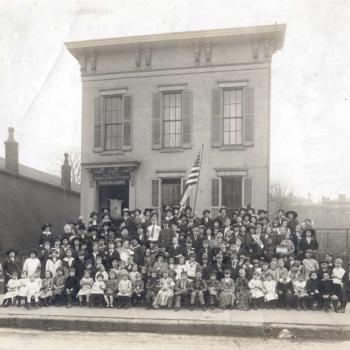
A student stopped me after class recently. She wanted to know if I listened to the Christian Feminism podcast because the latest episode mentioned me. “I realized,” she said, “that I knew Dr. Barr!”
So of course I listened. It gave a good summary of the Owen Strachan and Beth Moore twitter event (if you missed it, see here and here). It was pretty critical of Strachan’s blogpost denouncing women preaching, “Divine Order in a Chaotic Age” (they really disliked his arrogant tone). It was also pretty critical of my blogpost, “Because Complementarianism is about Power” (they really disliked my word clouds). I still enjoyed it, though. As I am working on my new book project, The Making of Biblical Womanhood, it is good to get constructive criticism that can help me reach my audience better.
But I kept thinking about one part of their criticism. I kept thinking about their emphasis on the Bible. Or, more precisely, their criticism that my article was not biblically based while Owen Strachan’s argument was biblically based. While they disliked both our articles, they were more convinced by Owen Strachan’s because they perceived his argument about women’s roles in the church to be substantiated by the scripture he quoted. In contrast, they perceived my lack of emphasis on the Bible as undermining my argument about biblical womanhood.
Do you see the Catch-22? My argument that Complementarianism has less to do with the Bible and more to do with power was undermined by my lack of emphasis on the Bible.
So I guess my husband was right (again). He told me that my biggest challenge would be biblicism (one of the four defining characteristics of evangelicalism according to my colleague and friend David Bebbington). Specifically, in the case of women’s roles, evangelical biblicism which emphasizes a handful of biblical verses to argue for male headship and female submission. Evangelical biblicism is pitted in opposition to evangelical feminism.
But is evangelical biblicism really biblicism? Or is it a selective biblicism?
It is ironic to me that our dogged emphasis on the Bible applies to some parts of the Bible more than others. We will quote 1 Corinthians 14:34-35 ad nauseam, proclaiming a “plain and literal interpretation.” But we grow strangely awkward around the “plain and literal interpretation” of passages like 2 Kings 22:11-20–the story of Huldah. Because we prefer to interpret 1 Corinthians 14:34-35 as women barred from teaching men, we are uncertain how to explain a woman like Huldah who teaches men. I mean, what do we do with a female prophet who is called on by the king and priests to confirm the authenticity of scripture and to interpret its meaning? As Scot McKnight writes, “Huldah is not chosen because no men were available. She is chosen because she is truly exceptional among the prophets.”
We accept the “plain and literal” interpretation of 1 Corinthians 14:34-35 and emphasize its teachings as “biblical”, but then we don’t know what to do with biblical women like Huldah.
We don’t like to admit that biblical women don’t fit our understanding of biblical womanhood.
Even John Piper once admitted that neither Huldah nor Deborah fit his understanding of male headship. As he wrote, trying to figure out how these clearly female leaders might not actually be in leadership over men: “The issue is how a woman should prophesy, not whether she should. Are Deborah and Huldah examples of how to ‘prophesy’ and ‘judge’ in a way that affirms and honors the normal headship of men?” As I said, evangelicals like John Piper accept the “plain and literal interpretation” of 1 Corinthians 14:34-35, but then do gymnastics trying to get out of the “plain and literal interpretation” of passages like 2 Kings 22:11-20.
So here is my question for evangelicals: what if we are wrong?
What if biblical women like Huldah actually do represent Biblical womanhood? What if Paul’s writings in 1 Corinthians 11 and 14, and etc., actually support women in leadership rather than barring women from leadership? What if our selective emphasis on the “plain and literal” meaning of a handful of verses has blinded us to what the Bible is actually saying about women and men? What if our human tendencies toward hierarchy and power have made us oppress women rather than follow the example of Christ?
What if biblical womanhood isn’t biblical?
For almost ten years I have been using a particularly powerful example in my Women’s History classes.
First, I ask the students to read a passage from the Roman historian Livy as he describes the opposition of Roman women to a particular law during the reign of Caesar Augustus. I have written about this before, so here is the short version: “What kind of behavior is this?,” writes Livy, recording the words the consul Cato the elder wanted to tell the women of Rome. “Running around in public, blocking streets, and speaking to other women’s husbands! Could you not have asked your own husbands the same thing at home?”
Second, I ask the students to read 1 Corinthians 14:34-35 from the RSV or NRSV. “The women should keep silence in the churches. For they are not permitted to speak, but should be subordinate, as even the law says. If there is anything they desire to know, let them ask their husbands at home. For it is shameful for a woman to speak in church.”
Third, I ask them what the passage in Corinthians sounds like. You can imagine their response. They immediately point out how similar 1 Corinthians 14:34-35 sounds to the Roman treatment of women–like maybe Paul is quoting Roman culture?
Finally, I ask them to read the entire passage of 1 Corinthians 14. But I ask them to read verses 34-35 as if they are NOT Paul’s words but actually reflecting Roman culture.
Listen to how it sounds now (NRSV 26-40):
What should be done then, my friends? When you come together, each one has a hymn, a lesson, a revelation, a tongue, or an interpretation. Let all things be done for building up. If anyone speaks in a tongue, let there be only two or at most three, and each in turn; and let one interpret. But if there is no one to interpret, let them be silent in church and speak to themselves and to God. Let two or three prophets speak, and let the others weight what is said. If a revelation is made to someone else sitting nearby, let the first person be silent. For you can all prophesy one by one, so that all may learn and all be encouraged. And the spirits of prophets are subject to the prophets, for God is a God not of disorder but of peace.
“As in all the churches of the saints, the women should keep silence in the churches. For women are not permitted to speak, but should be subordinate, as even the law says. If there is anything they desire to know, let them ask their husbands at home. For it is shameful for a woman to speak in church.”
WHAT! Did the Word of God originate with you, or are you the only ones it has reached? If any one thinks that he is a prophet, or spiritual, he should acknowledge that what I am writing to you is a command of the Lord. If any one does not recognize this, he is not recognized. So, my friends, be eager to prophesy, and do not forbid speaking in tongues; but all things should be done decently and in order.
Could it be that Paul is rebuking the Corinthian church for silencing women?
Theologian Lucy Peppiatt, in her recent and beautifully written book Rediscovering Scripture’s Vision for Women: Fresh Perspective on Disputed Texts, argues that Paul in both Corinthians 11 and 14 is best understood as “in conversation with the bullying, domineering men of Corinth.” As she continues, “The same men who have implemented head coverings for the wives in the Corinthians church (because their husbands are the image and glory of God, and the wives are the glory of their husbands) are mandating that they should be silent and in submission in the public assembly. Paul, however, comes out strongly against this, ‘What! Did the word of God originate with you, or are you the only one it has reached?’ In other words, he rebukes them for their misinterpretations and practices that demean women while claiming that they have the ‘word of God.’ They are not the ones to decide that this is what the law says. Paul, the apostle, releases women to pray and prophesy in public along with the men, as he has just explained. They are not to sit in silence but participate equally with their husbands.” (p. 76)
Instead of Paul commanding women to be silent, Paul is rebuking those who try to silence women. Paul is supporting women’s ability to speak and prophesy like men.
So let me ask this question again: What if evangelical understanding of biblical womanhood is a complete misunderstanding of biblical text? What if biblical womanhood, as understood by evangelicals today, really isn’t biblical?
Just last May, Beth Moore asked Southern Baptist leaders to grapple with all the texts in the New Testament about women. As she tweeted: “What I plead for is to grapple with the entire text from Mt 1 thru Rev 22 on every matter concerning women. To grapple with Paul’s words in 1 Tim/1 Cor 14 as being authoritative, God-breathed!-alongside other words Paul wrote, equally inspired & make sense of the many women he served alongside.”
I think it is time we took up Beth Moore’s challenge. I think it is time we made sure our understanding of biblical womanhood is actually biblical.
I’m game. How about you?













